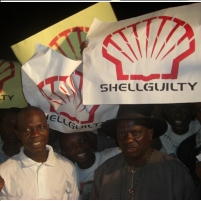Supreme Court Prepares to Hear Major Case on Corporate Responsibility Abroad
Sunday, February 26, 2012
 Ogoni in Nigeria (photo: shellguilty.com
Ogoni in Nigeria (photo: shellguilty.com
The responsibility of major corporations for human rights abuses abroad will be argued on Tuesday in front of the Supreme Court. In the case, Esther Kiobel v. Royal Dutch Petroleum, Shell is accused of assisting the Nigerian government in torturing and executing activists who were protesting Shell’s drilling operations in the Ogoni region of Nigeria, including Kiobel’s late husband, Dr. Barinem Kiobel. Kiobel and the others are suing under the Alien Tort Claims Act (ATCA), which was passed in 1789 and allows federal courts to hear “any civil action by an alien for a tort only, committed in violation of the law of nations or a treaty of the United States.” Although ATCA was little used for about 190 years, since 1980 foreign nationals have used it more than 120 times to sue 59 corporations for acts perpetrated on them overseas. Examples include Indonesian villagers accusing ExxonMobil’s security forces of murder, torture and other abuses in 1999-2001; Firestone Tire Company accused of using child labor in Liberia; and Ford Motor and other firms accused of aiding South Africa’s apartheid system.
Shell and its corporate allies argue that the statute should be applied only to individuals, and not to corporations, in part because lawsuits against corporations can drag on for years. Other courts have allowed ATCA suits against corporations, but the Second Circuit Court of Appeals, based in New York, accepted Shell’s argument in a ruling in 2010, thus setting up the Supreme Court showdown. For its part, the Obama administration has taken the side of Esther Kiobel.
One question that looms large, although it is technically separate, is how the Supreme Court will reconcile this case with that of Citizens United, in which the Court last year held that corporations have free speech rights that were violated by laws limiting or prohibiting corporate spending on political campaigns. Those who support application of ATCA to corporations point out that it would be inconsistent to treat corporations as legal “persons” when it comes to free speech rights, but not as persons when it comes to paying for wrongful acts.
-Matt Bewig
To Learn More:
Supreme Court to Hear Corporate Human Rights Case (by James Vicini, Reuters)
Should Corporations Have More Leeway to Kill Than People Do? (by Peter Weiss, New York Times)
Corporations that Are Human Rights Abusers: SC Decides If They Can Be Brought to Book (Democracy Now)
Halliburton Pays Nigeria $250 Million to Drop Charges against Dick Cheney (by Noel Brinkerhoff, AllGov)
- Top Stories
- Unusual News
- Where is the Money Going?
- Controversies
- U.S. and the World
- Appointments and Resignations
- Latest News
- Trump Renames National Football League National Trump League
- Trump to Stop Deportations If…
- Trump Denounces World Series
- What If China Invaded the United States?
- Donald Trump Has a Mental Health Problem and It Has a Name






Comments